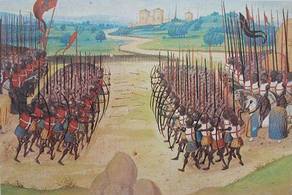Before the battle, which Henry was actually trying to avoid, he ordered the archers to find and sharpen both ends of a six-foot wooden stick. These were then hammered into the soft ground of the plain where the battle ultimately took place. It rained the night before the battle, and there was mud and soft earth all throughout the battleground. The wooden stakes were pointed outwards, towards the French lines. When the French knights on horseback charged the English archers, many of the horses would not advance through the thicket of sharpened points. Archers picked off horses and knights from a distance and at close range. French knights and men at arms were trapped by their heavy armour in the mud, becoming easy prey for the outnumbered English. the French who had not been killed or stuck in the melee fled.
Some say that the French knights had issued threats that, if they caught any archers from the English side, they would cut off their inside fingers, so they could not pull back a bowstring. To taunt these French knights, the English archers held up their middle fingers to show they still had them.
Noble French prisoners, who could have been sold for rich ransoms, were ordered killed after the French retreat. Henry was worried these prisoners would rise up and attack the English from behind if, or when, another wave of French knights appeared to engage his forces.


 RSS Feed
RSS Feed
